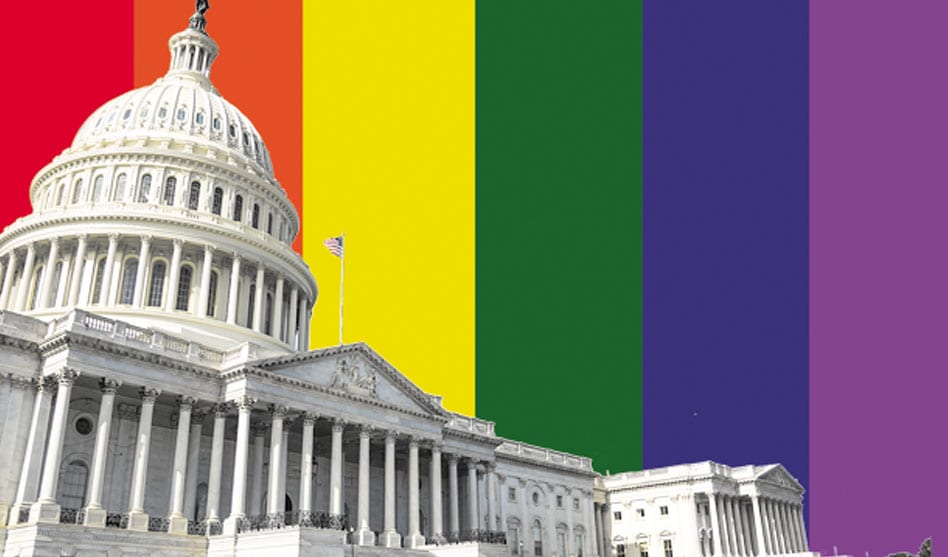LGBT candidates make historic gains across the country
Lisa Keen | Keen News Service
lisakeen@mac.com
As the first returns in Minnesota’s Second Congressional District began to emerge Tuesday night, Nov. 6, it looked as if lesbian businesswoman Angie Craig would lose — a second time — to a former talk show host that once compared LGBT people to criminals.
At the three-hour mark after polls had closed, Craig, the Democrat, was trailing Republican U.S. Rep. Jason Lewis. But before midnight, a “blue wave” began breaking in the state, and Craig’s campaign delivered not only its own victory but an important win for the LGBT community and a critical threshold that ensured Democrats would take back control of the U.S. House.
Overall Tuesday night, openly-LGBT candidates picked up three new seats in the U.S. House: Craig in Minnesota, Chris Pappas in New Hampshire and Sharice Davids in Kansas. All three were the first openly-LGBT candidates to win election to Congress from their states, and Davids was one of the first two Native American women elected to Congress.
U.S. Rep. Jared Polis won his historic bid to become governor of Colorado and is the first openly-gay man to be elected governor of any state. Voters also welcomed three new lesbian mayors: Teri Johnston in Key West, Betsy Driver in Flemington, N.J., and Julia Fahl in Lambertville, N.J.
LGBT candidates around the country won in large numbers. Of the 225 openly-LGBT candidates endorsed by The LGBT Victory Fund, 151 — more than half — have already been declared winners in their races, with several others yet to be determined.
And there were also some historic races with no winner yet declared as of press deadline:
U.S. Rep. Kyrsten Sinema’s bid for a U.S. Senate seat from Arizona was still in limbo. With 99 percent of precincts tallied, Sinema had 48.46 percent of the vote to Republican Martha McSally’s 49.30 percent. No winner has yet been declared for the Michigan attorney general seat, though Michigan Secretary of State results Wednesday morning showed Republican John James had 49.57 percent of the vote to lesbian attorney Dana Nessel’s 45.54 percent. Bisexual Democratic candidate Katie Hill was hanging onto a razor-thin lead over Republican incumbent U.S. Rep. Steve Knight in California’s 25th Congressional district.
And in Texas, congressional candidate Gina Ortiz Jones trailed her Republican opponent by less than 1 percentage point, with provisional and overseas/military ballots yet to be counted. Jones’ campaign is already gearing up for a recount in that race.
And to top off the rainbow wave, voters in Massachusetts said a resounding “Yes” to retaining a state law prohibiting discrimination based on gender identity in public accommodations — the first statewide vote on such protections.
There were not, of course “blue waves” in every state on Tuesday, leaving the LGBT community disappointed in many instances. Transgender Democrat Christine Hallquist fell short in her bid to unseat Vermont’s Republican incumbent Gov. Phil Scott, for one.
According to the Victory Fund, 2018 marked the first time in U.S. history that there was an openly-LGBT candidate running for office in every state. Victory Fund Executive Director Annise Parker called it “an unprecedented rainbow wave.”
Parker also said that Wisconsin Sen. Tammy Baldwin’s re-election was among the community’s “highest priorities” for 2018, and “to see this champion of equality handily defeat her anti-LGBTQ opponent was phenomenal.”
A new Congress
Openly LGBT candidates were running for 23 seats in the U.S. House and four in the U.S. Senate. They won at least seven U.S. House seats and one U.S. Senate seat.
As expected, Democratic U.S. Senator Tammy Baldwin breezed to re-election in Wisconsin. Green Party candidate Paula Overby in Minnesota and Independent candidate Brad Peacock in Vermont lost their bids for U.S. Senate seats.
The four incumbent LGBT U.S. representatives running for re-election all won: David Cicilline in Rhode Island (who is expected to seek a leadership position in the newly Democratic House), Sean Maloney in New York, Mark Pocan in Wisconsin and Mark Takano in California. The newcomers, so far, will be Chris Pappas from New Hampshire, Sharice Davids from Kansas, and Angie Craig from Minnesota.
Governors
There were four openly-LGBT candidates for governor across the country on Tuesday night. Incumbent Democratic Gov. Kate Brown of Oregon won re-election with a five-point margin. And as noted earlier, U.S. Rep. Jared Polis won with a six-point lead over his Republican opponent in Colorado.
Both losing LGBT candidates for governor earned strong support at the ballot box, despite coming up short.
Christine Hallquist, a state energy activist who became the first transgender candidate to win a major party nomination for governor, won a robust 40.5 percent of the vote, but was ultimately beaten by popular Republican incumbent Gov. Phil Scott in Vermont. And Lupe Valdez, a former Dallas County sheriff, won 42 percent of the vote against Republican incumbent Gov. Greg Abbott in Texas.
Transgender referendum
Voters in Massachusetts did not vote as strongly to keep a transgender non-discrimination law as polls had predicted. The latest poll predicted 74 percent would vote to retain the two-year-old law. But, with 82 percent of the vote in, 68 percent voted “Yes” on Question 3, still ensuring the law would remain intact.
“By winning the first statewide popular vote on transgender rights, Massachusetts voters reaffirmed our Commonwealth as a place that fiercely defends our basic values of dignity and respect for everyone,” said ACLU Massachusetts Executive Director Carol Rose.












